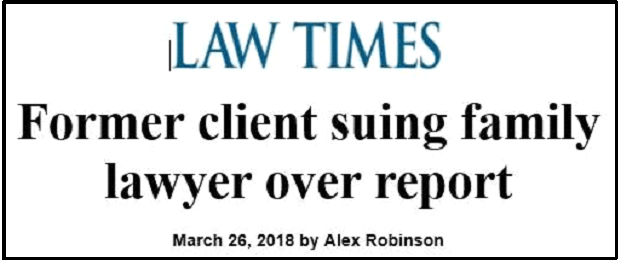Could a family court judge reject the recommendations of the family conflict resolution team?
It is well known that if matters go to court, a judge in family court can reject any report he/she wants to, no matter who produces the report. In many cases, even reports from highly recognized and influential professionals with several university degrees have been rejected for being biased and unprofessional. Some professionals have been discredited for their faulty work in conducting assessments for family and child protection proceedings. Time has shown that using professionals in family court proceedings does not guarantee successful outcomes.
Just one headline from an article in one of Ontario’s foremost publications for the legal industry (shown below) is an example of how more parties are pushing to make lawyers and other professionals more accountable in family court proceedings as a result of the work done by some well-established professionals.

Where parties do have the financial resource to pay for professional services and opt to pay for such services, professional services will be used during the Program and the parties will be required to pay for such services. Professionals providing services in conjunction with the Program will always be overseen by other team members who will ensure that the services which they are providing are more reliable in comparison to a professional who is acting alone and providing the same services.
Anyone who supports the Program must appreciate that there may be cases where participants simply cannot afford services offered by highly paid professionals such as mediators, arbitrators and custody evaluators. This reality cannot be ignored and cost effective alternatives must be made available to such participants. To add more courts, more judges and more taxpayer funded professionals to our family court system is definitely not the answer to fix our broken family courts.
For those parties who cannot afford to pay for these high cost services, the Program offers the next best alternative to a judge and this is a comprehensive review of the information by a team of trained family conflict resolution workers. With many judges unable to find the time to read extensive court documentation, the Program can assist a family court judge to make a more informed ruling for the circumstances.
When a report from the program is put forward to a court by a litigant, the judge will be assured that the findings and recommendations contained in the report have been carefully analyzed and discussed by a team of trained persons and that every reasonable attempt was made to get the parties to come to a fair agreement before taking matters back to court. The process used under the Program is similar to restorative justice practices where family, friends and community help a family resolve conflict.